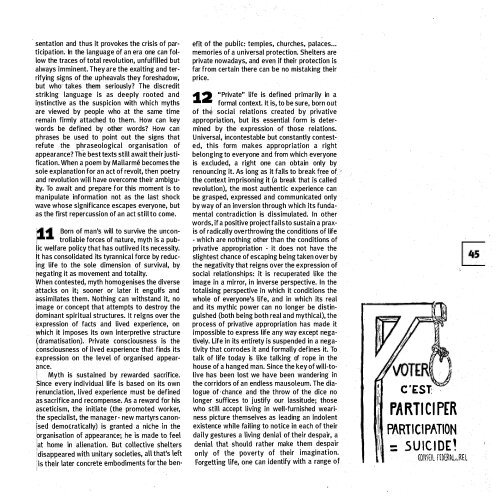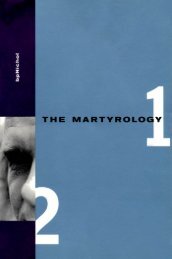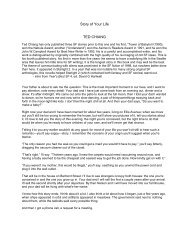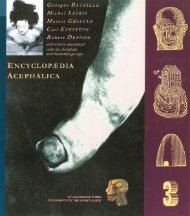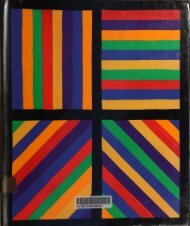SITUATIONISTS AND THE 1£CH MAY 1968
umMYFs
umMYFs
You also want an ePaper? Increase the reach of your titles
YUMPU automatically turns print PDFs into web optimized ePapers that Google loves.
j<br />
· sentation and thus it provokes the crisis of participation.<br />
In the language of an era one can follow<br />
the traces of total revolution, unfulfilled but<br />
always imminent. They are the exalting and terrifying<br />
signs of the upheavals they foreshadow,<br />
but who takes them seriously? The discredit<br />
striking language is as deeply rooted and<br />
instinctive as the suspicion with which myths<br />
are viewed by people who at the same time<br />
remain firmly attached to them. How can key<br />
words be defined by other words? How can<br />
phrases be used to point out the signs that<br />
refute the phraseological organisation of<br />
appearance? Th·e best texts still await their justi·<br />
fication. When a poem by Mallarme becomes the<br />
sole explanation for an act of revolt, then poetry<br />
and revolution will have overcome their ambigu·<br />
ity. To await and prepare for this moment is to<br />
manipulate information not as the last shock<br />
wave whose significance escapes everyone, but<br />
as the first repercussion of an act still to come.<br />
Born of man's will to survive the uncon·<br />
trollable forces of nature, myth is a public<br />
welfare policy that has outlived its necessity.<br />
it has consolidated its tyrannical force by reducing<br />
life to the sole dimension of survival, by<br />
pegating it as movement and totality.<br />
When contested, myth homogenises the diverse<br />
attacks on it; sooner or later it engulfs and<br />
assimilates them. Nothing can withstand it, no<br />
image or concept that attempts to destroy the<br />
dominant spiritual structures. lt reigns over the<br />
expression of facts and lived experience, on<br />
which it imposes its own interpretive structure<br />
(dramatisation). Private consciousness is the<br />
tonsciousness of lived experience that finds its<br />
xpression on the level of organised appear·<br />
ance.<br />
Myth is sustained by .rewarded sacrifice.<br />
Since every individual life is based on its own<br />
renunciation, .lived experience must be defined<br />
as sacrifice and recompense. As a reward for his<br />
asceticism, the initiate (the promoted worker,<br />
the specialist, the manager- new martyrs canonised<br />
democratically) is granted a niche in the<br />
organisation of appearance; he is made to feel<br />
!at home in alienation. But collective shelters<br />
!disappeared with unitary societies, all that's left<br />
'is their later concrete embodiments for the ben·<br />
j<br />
efit of the public: temples, churches, palaces ...<br />
memories of a universal protection. Shelters are<br />
private nowadays, and even if their protection is<br />
far from certain there can be no mistaking their<br />
price.<br />
12 "Private" life is defined primarily in a<br />
formal context. lt is, to be sure, born out<br />
of thJ social relations created by privative<br />
appropriation, but its essential form is deter·<br />
mined by the expression of those relations.<br />
Universal, incontestable but constantly contest·<br />
ed, this form makes appropriation a right<br />
belonging to everyone and from which everyone<br />
is excluded, a right one can obtain only by<br />
renouncing it. As long as it fails to break free of. ·<br />
the context imprisoning it (a break that is called<br />
revolution), the most authentic experience can<br />
be grasped, expressed and communicated only<br />
by way of an inversion through which its funda·<br />
mental contradiction is dissimulated. In other<br />
words, if a positive project fails to sustain a prax·<br />
is of radically overthrowing the conditions of life<br />
· which are nothing other than the conditions of<br />
privative appropriation - it does not have the<br />
slightest chance of escaping being taken over by<br />
the negativity that reigns over the expression of<br />
social relationships: it is recuperated like the<br />
image in a mirror, in inverse perspective. In the<br />
totalising perspective in which it conditions the<br />
whole of everyone's life, and in which its real<br />
and its mythic power can no longer be distinguished<br />
(both being both real and mythical), the<br />
process of privative appropriation has made it<br />
impossible to express life any way except negatively.<br />
Life in its entirety is suspended in a negativity<br />
that corrodes it and formally defines it. To<br />
talk of life today is like talking of rope in the<br />
house of a hanged man. Since the key of will-to·<br />
live has been lost we have been wandering in<br />
the corridors of an endless mausoleum. The dia·<br />
logue of chance and the throw of the dice no<br />
longer suffices to justify our lassitude; those<br />
who still accept living in well-furnished weari·<br />
ness picture themselves as leading an indolent<br />
existence while failing to notice in each of their<br />
daily gestures a living denial of their despair, a<br />
denial that should rather make them despair<br />
only of the poverty of their imagination.<br />
Forgetting life, one can identify with a range of<br />
'11 C'EST<br />
J PA RTI CIP£R<br />
PARTICIPATION<br />
: SUtCID['<br />
(QNSEIL r£DffiL.Rf.l


